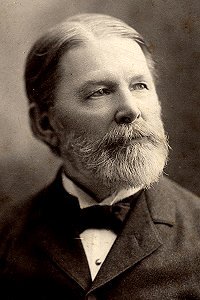They tore them from their mother’s arms
And from their childish play,
They said, “We must have victims twain
For hungry waves today.
The ocean goddess wakes from sleep,
She stretches out her hand,
And if she loose the water-floods
They will o’erwhelm the land.
Her voice is in the rising storm,
Her shadow dims the skies,
She shrieks aloud in every blast
For human sacrifice!
They drive the children down the beach—
Ah! work of shame and sin—
And bind them fast to wooden stakes
Where swift the tide comes in;
And then to face their awful doom
The two young creatures wait,
While on the dyke the gathering crowd
Looks down to see their fate.
Ah! mother, vain are all your prayers;
Your sobs and tears how vain!
Does mighty ocean goddess reck
Of human grief or pain?
The tide comes rushing madly in,
The winds blow fresh and free,
You scarce can mark the children’s heads
Above the angry sea.
The throngs increase, the heathen king
Comes down and takes his place,
And at his side S. Wolfram stands
With sad and troubled face:
Vain all his prayers and preaching, vain
His toil by day and night;
This people walk in darkness yet,
And will not see the light.
Nay, I’ll believe,
King Radbod cries,
Your God is strong to save,
If you can bring those helpless lads
From yonder watery grave.
And loud he laughed—the mocking throng
Replied with laughter loud;
But louder Wolfram’s answer rang
Above the jeering crowd.
The God I serve is strong to save
On ocean as on land;
The very water-floods He holds
In hollow of His hand,
And if He wills that I shall live,
No wave shall touch my feet;
And if He wills that I shall die,
Then such a death were sweet.
He turned him from the monarch’s side,
The people held their breath;
Who dares to face a sea like that
Prepares for certain death:
The foaming waves rush wildly in,
And thunder on the shore;
You could not hear the children’s cries
Above that mighty roar.
Yet swiftly down the rocky beach
Went on the saintly man;
Thrice fool is he,
the people cried,
Who tempts the Goddess Ran.
And then a sudden silence fell
On all who stood around,
For Wolfram walked upon the sea
As though on solid ground.
As if upon a hillside green,
Amid the flood he stood,
And cut the children’s cruel bonds
That bound them to the wood.
He drew them from the sweltering tide—
Now, nothing fear,
spake he,
But call on Him who walked the waves
In distant Galilee.
And taking in his kindly grasp
A child on either hand,
Across the raging, trackless waste
The three came back to land.
O mother, clasp again your sons
Safe and unharmed!
he cried;
Now will ye not believe on Him—
On Christ the crucified?
With wet the children’s raiments streamed
But Wolfram walked dry-shod;
Then with one voice the people cried,
“How great is Wolfram’s God!
The gods we serve are not as this,
With all their vaunted powers:
O Wolfram, teach us of your God,
And we will make Him ours!
Then wash us in the mystic flood
That cleanseth sin away,
And mark us with the Holy Sign
We take for ours to-day.
And Wolfram rendered thanks to Heav’n
With eyes that glad tears dim,
That Christ uplifted on His Cross
Draws all men unto Him.
Thus with its double meanings quaint,
The strange old legend runs,
How Wolfram won, for God, the hearts
Of Friesland’s savage sons.
Arranged from Christian Burke,
The Flowering of the Almond-Tree, 1896
